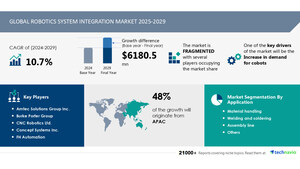NEW YORK, Jan. 22, 2025 /PRNewswire/ -- Report on how AI is driving market transformation - The global business productivity software market size is estimated to grow by USD 119.4 billion from 2025-2029, according to Technavio. The market is estimated to grow at a CAGR of 17.6% during the forecast period. Increasing requirements for large-scale business portfolio management is driving market growth, with a trend towards automatic updating and enhancing coherency in business operations. However, cybersecurity-related threats risk associated with business productivity software solutions poses a challenge. Key market players include Adobe Inc., Alphabet Inc., Amazon.com Inc., Asana Inc., Atlassian Corp Plc, Bending Spoons S.p.A., Broadcom Inc., Cisco Systems Inc., Dropbox Inc., Expensify Inc, International Business Machines Corp., Microsoft Corp, monday.com Ltd., Oracle Corp, Salesforce Inc., SAP SE, Smartsheet Inc., TIBCO Software Inc., Toggl, and Zoho Corp. Pvt. Ltd..
Key insights into market evolution with AI-powered analysis. Explore trends, segmentation, and growth drivers- View Free Sample PDF
Business Productivity Software Market Scope |
|
Report Coverage |
Details |
Base year |
2024 |
Historic period |
2019 - 2023 |
Forecast period |
2025-2029 |
Growth momentum & CAGR |
Accelerate at a CAGR of 17.6% |
Market growth 2025-2029 |
USD 119.4 billion |
Market structure |
Fragmented |
YoY growth 2022-2023 (%) |
15.2 |
Regional analysis |
North America, Europe, APAC, South America, and Middle East and Africa |
Performing market contribution |
North America at 37% |
Key countries |
US, UK, China, Canada, Germany, France, Japan, Brazil, India, and Saudi Arabia |
Key companies profiled |
Adobe Inc., Alphabet Inc., Amazon.com Inc., Asana Inc., Atlassian Corp Plc, Bending Spoons S.p.A., Broadcom Inc., Cisco Systems Inc., Dropbox Inc., Expensify Inc, International Business Machines Corp., Microsoft Corp, monday.com Ltd., Oracle Corp, Salesforce Inc., SAP SE, Smartsheet Inc., TIBCO Software Inc., Toggl, and Zoho Corp. Pvt. Ltd. |
Business productivity software is a vital toolset for organizations seeking to streamline operations, optimize resource utilization, and enhance employee performance. Trends in this market include completion times and productivity management, integration capabilities with communication platforms, workflow automation, and knowledge sharing. Cloud-based solutions offer flexibility and scalability, enabling access from laptops, tablets, and smartphones. AI and machine learning are integral, providing automation, decision-making support, and project updates. Key features include task tracking, communication channels, document collaboration tools, and data analytics. Data security is paramount, with encryption, access control, and intrusion detection software essential. Integration with ERP, CRM, and other business functions is crucial for operational efficiency and customer satisfaction. Cost-effective deployment models, such as subscription-based services, are popular. Hybrid work environments demand mobile capability and cybersecurity. Overall, business productivity software empowers organizations to turnaround projects faster, improve employee productivity, and make informed decisions based on real-time data.
Business productivity management involves creating and updating project schedules, a time-consuming and frustrating task for project managers, engineers, and analysts. Intelligent project portfolio management scheduling tools integrated into business operating systems streamline this process. These tools prompt users to perform essential tasks and refer to a predefined process library for optimal output. If a process output is missing, the tool prompts a message to create it. Additionally, the tool checks for necessary skills and resources required to complete tasks, ensuring productivity and efficiency.
Request Sample of our comprehensive report now to stay ahead in the AI-driven market evolution!
• Business productivity software is essential for managing completion times, optimizing employee productivity, and streamlining operations in today's fast-paced business environment. However, selecting the right software comes with challenges such as integration capabilities with communication platforms, workflow tools, and document collaboration systems. Additionally, data silos can hinder business efficiency, making it crucial to choose cloud-based solutions with data analytics capabilities. Employees working remotely require mobile access to productivity software, making cloud-based services a popular choice. However, data security is paramount, so encryption, access control, and intrusion detection software are necessary. Communication channels, task tracking, and project planning are also essential features for business productivity. AI and automation can help optimize resource utilization, reduce turnaround times, and improve decision-making. ERP systems and business intelligence tools can provide valuable insights into project progress and employee performance. Subscription-based models offer cost-effectiveness, while on-premises solutions offer data security and control. Hybrid work environments require mobile capability, with laptops, tablets, and smartphones supporting productivity software. Collaboration tools and document management systems enable knowledge sharing and error reduction. Cloud technology and cyber threats require security measures, while scheduling software and telecommunications tools ensure effective project planning and customer satisfaction.
• Businesses prioritize data security in their use of productivity software, particularly in the context of cloud models like OpenStack. Man-in-the-middle (MiTM) attacks pose a threat to the object storage component of these applications. To mitigate risks, enterprises require advanced security features. A major concern is the lack of verification of certification authority (CA) credentials during SSL connections. With increasing data storage on cloud platforms, security becomes even more critical to prevent hacking and malware infections. Organizations demand security solutions to safeguard their productivity software investments.
Discover how AI is revolutionizing market trends- Get your access now!
This business productivity software market report extensively covers market segmentation by
- Deployment
- 1.1 Cloud
- 1.2 On-premises
- End-user
- 2.1 Large enterprise
- 2.2 SMEs
- Geography
- 3.1 North America
- 3.2 Europe
- 3.3 APAC
- 3.4 South America
- 3.5 Middle East and Africa
1.1 Cloud- The business productivity software market has experienced a strong demand for cloud-based solutions due to their cost-efficiency and scalability. Cloud-based software eliminates the need for businesses to invest in costly hardware, infrastructure, and maintenance. This model is accessible to businesses of all sizes, including startups and small businesses. Cloud-based solutions offer easy scalability, allowing businesses to adjust their software usage as their needs change without significant upfront investments. Providers of cloud-based business management software, such as Microsoft and Google, frequently roll out updates and security patches, ensuring businesses have access to the latest features and security enhancements without the hassle of manual upgrades. Microsoft 365, a leading example of cloud-based productivity software, offers real-time collaboration, access to files from multiple devices, and automatic updates. Google Workspace, another prominent player, is popular for its collaborative features and cloud-based storage. The demand for cloud-based business productivity software is expected to continue growing as businesses increasingly rely on technology to streamline operations and remain competitive. This trend will positively impact the growth of the cloud segment of the business productivity software market during the forecast period.
Download a Sample of our comprehensive report today to discover how AI-driven innovations are reshaping competitive dynamics
The Business Productivity Software market is experiencing significant growth due to the increasing need for digital transformation, agile methodology, and change management in businesses of all sizes. Cloud computing plays a crucial role in enabling remote work solutions, HR technology, and enterprise resource planning. Lean management and business process automation help improve work-life balance and performance management. Digital transformation brings about the need for data-driven decision making, business intelligence, and data analytics tools. Industry-specific Business Process Services (BPS) cater to unique business functions, while data governance ensures data security and compliance with regulations. Disaster recovery, risk management, and cybersecurity solutions protect against potential threats. Hybrid cloud and IT infrastructure management provide flexibility and scalability. Data storage and data visualization tools help make sense of large data sets. Cloud migration and enterprise mobility enable a mobile workforce. Business continuity planning and project management tools keep operations running smoothly. Time tracking software and performance management solutions help optimize productivity. Employee engagement and experience are essential for talent acquisition and retention. Compliance and regulations, process improvement, and digital transformation continue to shape the future of the Business Productivity Software market.
Business productivity software refers to applications designed to help organizations streamline operations, optimize resource utilization, and enhance employee productivity. These solutions offer various features such as task management, communication channels, workflow automation, knowledge sharing, and reporting. Integration capabilities with other business functions like customer relationship management (CRM), enterprise resource planning (ERP), and project planning are essential. Cloud-based productivity software enables hybrid work and remote access, making it flexible for employees working from home or on-the-go. Accessibility on laptops, tablets, and smartphones enhances mobility and productivity. Productivity management software facilitates data analytics, allowing businesses to make informed decisions based on key performance indicators (KPIs) like completion times, turnaround times, and project progress. AI and machine learning capabilities help automate repetitive tasks, reducing errors and improving operational efficiency. Cloud technology ensures scalability and cost-effectiveness, while data security features like encryption, access control, and intrusion detection protect sensitive information. Collaboration tools enable real-time document editing and sharing, fostering effective communication and knowledge transfer among teams. Subscription-based models offer affordability and ease of use, making productivity software accessible to businesses of all sizes. However, businesses must consider the deployment model, data collection, and data silos when choosing a productivity solution to ensure seamless integration and efficient workflows.
1 Executive Summary
2 Market Landscape
3 Market Sizing
4 Historic Market Size
5 Five Forces Analysis
6 Market Segmentation
- Deployment
- Cloud
- On-premises
- End-user
- Large Enterprise
- SMEs
- Geography
- North America
- Europe
- APAC
- South America
- Middle East And Africa
7 Customer Landscape
8 Geographic Landscape
9 Drivers, Challenges, and Trends
10 Company Landscape
11 Company Analysis
12 Appendix
Technavio is a leading global technology research and advisory company. Their research and analysis focuses on emerging market trends and provides actionable insights to help businesses identify market opportunities and develop effective strategies to optimize their market positions.
With over 500 specialized analysts, Technavio's report library consists of more than 17,000 reports and counting, covering 800 technologies, spanning across 50 countries. Their client base consists of enterprises of all sizes, including more than 100 Fortune 500 companies. This growing client base relies on Technavio's comprehensive coverage, extensive research, and actionable market insights to identify opportunities in existing and potential markets and assess their competitive positions within changing market scenarios.
Technavio Research
Jesse Maida
Media & Marketing Executive
US: +1 844 364 1100
UK: +44 203 893 3200
Email: [email protected]
Website: www.technavio.com/
SOURCE Technavio

WANT YOUR COMPANY'S NEWS FEATURED ON PRNEWSWIRE.COM?
Newsrooms &
Influencers
Digital Media
Outlets
Journalists
Opted In




Share this article